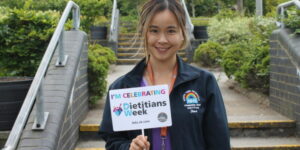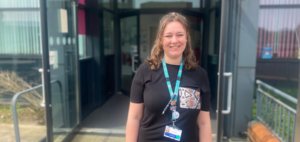Staff profiles
350 careers. One NHS. Your future.
Whatever your skills, qualifications or interests, there is a career for you in the NHS and we are recruiting now. You could work directly with patients, in hospitals, an ambulance trust, or in the community. And once you are part of the NHS team we’ll work with you to develop your career, and fulfil your potential.
Meet NHS staff from a variety of roles across the North East and Yorkshire
Dove Yu works in South Tees Hospitals NHS FT as a senior specialist dietitian in oncology and palliative care.
Dove initially completed a BSc in Food and Human Nutrition at Newcastle University in 2017 with a year of placement at MRC (Medical Research Council) Human Nutrition Research. She then went on to kickstart her career as dietitian by securing a PG Diploma in Dietetics at Leeds Beckett University, which included three clinical placements.
Armed with a wealth of knowledge and experience, she started her journey with South Tees Hospitals NHS Foundation Trust as a placement student in 2019.
She loved her time there so much that she secured a full-time job in the same year and commenced her career as a specialist dietitian.
Dove chose to be a dietitian because she loved helping people through her favourite thing: food.
She also has a personal story behind her decision to become a dietitian.
She said: “I witnessed my dad losing 80lbs and reversing his diabetes when I was a kid using dietary and exercise interventions with the help of a dietitian.
“Communication plays a big part in the nutrition consultation rather than actual hands-on jobs. Dietetics research is highly evolving, and it is a diverse field with lots of future opportunities.”
Dove feels her job is very rewarding as she gets to witness her patients improving their nutritional status and recovering from cancer, whilst helping patients with a palliative diagnosis doing what they wish in their life.
“Making a difference in a patient’s life is such a blessing. Sometimes a simple smile and thank you from a patient can make my day,” said Dove.
Anyone aspiring to become a dietitian can find lots of useful information on the official BDA website.
Meet Emily, a nurse who works at Sheffield Children’s Becton Centre for Children and Young People, a state-of-the-art centre for children and young adults aged up to 18 with mental health issues and learning disabilities.
A keen cheesecake maker and self-professed bookworm who also happens to be a Clinical Staff Nurse specialising in Learning Disabilities!
Emily joined the Sheffield Children’s team in 2020 after graduating from Sheffield Hallam University with a degree in Learning Disabilities and Social Work. Reflecting on her journey, Emily shares: “I discovered my calling during a work experience stint at a day centre for adults with learning disabilities. From that moment, I was determined to pursue a career in learning disability nursing.
“I went on to study Health and Social Care at college followed by a three-year undergraduate degree. In my first year of university I went on a mental health placement, which inspired me to tie in mental health with learning disabilities.
“I also really wanted to work with children so when a job came up at Sheffield Children’s that combined all of my passions I had to jump on it and I absolutely love it!”
The Becton Centre is a unique service specialising not only in mental health but also in learning disabilities so working at Becton enables Emily to use all of her knowledge, skill and passions to help children.
Day to day you’ll find Emily providing holistic care for the children and young people she looks after: “We tailor the care we provide to each child’s unique needs, considering their mental and physical well-being, home environment, and sensory preferences,” she explains.
Speaking in May 2024 to mark International Nurses Day, Emily said: “I think the main thing I love about being a nurse is the problem-solving, you’re always trying to find an innovative way to care for a child or young person and it’s great when you find a solution that works.
“Being a nurse allows me to make a tangible difference in a child’s life. While the journey may be challenging, witnessing a child’s transformation under our care is incredibly rewarding.”
Kelly Manford was a beauty therapist for 15 years when she enrolled on the Step into Work scheme at North Cumbria Integrated Care NHS Foundation Trust (NCIC) – a eight week programme that gives candidate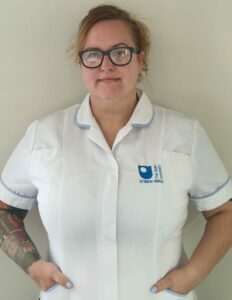 s experience they need to get a job in healthcare.
s experience they need to get a job in healthcare.
Kelly said:
“My Step into Work placement was on Ward 4 at West Cumberland Hospital (in Whitehaven) which is elderly care. As soon as I stepped onto the floor and got to work with people, I knew it was what I wanted to do. I was there for a week or two but by the end all I wanted was to find out how to be a nurse.
“The feeling you get from helping people in need is overwhelming, it’s not even the thank you, but the look in their eyes of thanks or the smile they give you. Even being able to give them time to have a chat with you it’s priceless.”
Kelly found about the programme from one of her clients who was a nurse. She said: “A client suggested I get into nursing as I had said I wanted to be able to do something where I can help people. I’d explained I didn’t have my GCSE maths or English and she suggested the Step into Work programme.
“After looking into it I was interviewed for a place. I kept working throughout the course which was hard but with the course being unpaid I needed to keep a wage. Step into work gave me the chance to see if I enjoyed working in health care before changing my career.”
Kelly was then successful in securing a bank healthcare assistant job.
“I was successful on the course and got a bank healthcare role and bank back on Ward 4 but my heart was set on A&E. The first thing I did was speak to the apprenticeship team to find out what I needed to do to get on the nursing apprenticeship. A year later, I had gained my Maths and English qualifications, a permanent contract in A&E and got a place to start the apprenticeship.
“The apprenticeship is a fantastic way to learn as you earn and have no student loans. You do nine placements and then work on base when not on placement. I have had some fantastic placements throughout the three year apprenticeship and met some people who have taught me so much. The trust has some really amazing people.
“It’s not all plain sailing having three children and a husband that works shifts. It’s very hard to juggle childcare, tutorials and assessments but focusing on the end goal of becoming a nurse kept me going.
“You form bonds with your fellow students and you all pull each other through, I had a very challenging time when I lost my brother in year three and my fellow students helped get me through to the end of the course. They are amazing people.”
“I now have a lifetime in blues ahead of me. It’s been a roller coaster of a ride and I wish I could remember the lady whose toes I was painting to thank her for suggesting it to me, to take the leap.
“I would recommend it to anyone. It is a roller-coaster and having a good support system around you and good resilience is the key.
The ‘Step into Work’ is a pre-employment programme at NCIC. It is designed to help people gain real work experience to pursue career as a health care assistant.
Learn more about Kelly and the ‘Step Into Work’ initiative here: https://www.ncic.nhs.uk/news/two-west-cumbrian-nurses-share-inspiring-stories-ahead-nurses-day
Meet James Atkinson, a newly qualified paramedic working at North East Ambulance Service.
In this video clip, James tells us about his role, how he got into healthcare and advice for anyone considering this career path.
Watch our full video with James talking about his experience.
Trust: North Lincolnshire and Goole NHS Foundation Trust
It was the last day of her six-month placement when we met up with Leah in the boiler house at the Diana, Princess of Wales Hospital, Grimsby – but she’s enjoyed her time here so much, she’s coming back as a volunteer over the summer.
She said: “I’m doing a T-Level in Maintenance, Installation and Repairs with the Tec Partnership at the Grimsby Institute.
“I hadn’t thought about a career in the NHS before doing the course, but when it came time to consider work placements, it was the first place I thought of.
“One of my tutors used to work here and he said it was a good place to come and do work experience.”
Leah added that one of the biggest benefits of doing her placement with us was the variety.
She said: “I’ll come in in the morning and I’ll find someone to go with for the day and it can be anything from mechanical, electrical, plumbing, and I’ll spend all day with that person, just going with them to the jobs they have to do.
“I know a lot of my friends have kind of got one thing they stick to, so they don’t really know exactly what they want to do, whereas I kind of know now. I definitely prefer the electrical side. I find it a bit more interesting than the mechanical bit.”
Trust: North Lincolnshire and Goole NHS Foundation Trust
Endorsements don’t get much better than this one from first year student James – “I would definitely recommend working at the hospital– in fact I did. There’s two more students who have come through from North Lindsey College to work at the hospital now!”
He is studying for a T-Level in Manufacturing, Installation and Repairs (general mechanics) and is loving his time on placement at Scunthorpe General Hospital.
He said: “I hadn’t thought about the NHS as a career path at all. I didn’t really think about hospitals requiring upkeep. I found out there were placements available with the NHS and I thought that could be really good. It’s a good fit and I am loving it.
“I’ve grown up around Scunthorpe. In fact, I was born at Scunthorpe Hospital., so it’s nice to be part of the team and give something back.
“I’ll shadow somebody for the whole day. I’ll be doing pre-planned maintenance with them, anything that needs doing really.
“I’d like to specialise in the mechanical side – I love doing the mechanical side. I said when I joined I’d like to do that, so when people go on mechanical jobs I go with them and shadow them.
“They’re all fantastic people. They’re all really knowledgeable, really kind, and willing to share their knowledge and teach you, which I find really beneficial.
“The placement structure is very good because I think that’s what companies look for in engineering – they look for pre-existing work experience and if you’ve got that here, it’s fantastic.”
NHS Humber Health Partnership’s Associate Director of Estates and Engineering, James Lewis, believes there are significant benefits to supporting the scheme.
He said: “Heading up the Estates and Engineering department for Northern Lincolnshire and Goole NHS Foundation Trust, now part of the wider NHS Humber Health Partnership, is a privilege in its own right, but then to also have fantastic engagement from two local colleges and be lucky enough to have keen, driven and enthusiastic T-level students take up T-level experiences within my teams is another level.
“It is wonderful to see these young people being able to experience what it is like to maintain a hospital and demonstrate the complexity of it all. This is the start of a great local partnership which will endure and offer, not only succession planning to my workforce, but local engineering career opportunities for local college students.”
Maisie Theobald’s personal experience of seeing a family member go through a cancer diagnosis played a big part in her wanting to undertake a T level in healthcare qualification as part of the long term goal of working towards becoming a nurse.
Maisie, a Hartlepool Sixth Form College student, has been working within the community nursing rapid response team based at the University Hospital of Hartlepool for one of her placement rotations and has shared her T Level experience with us so far.
Read the full story on the trust website here.
Tell us a little bit about your T Level Experience so far.
My first placement was in the rapid response team, where I worked alongside nurses and healthcare assistants to assist patients with tasks they were unable to complete. This included: washing and dressing, mobilising, meal preparation, observing medication prompts and taking bloods.
This helped me put into perspective the kind of responsibilities that I would be given and the skills and qualities that were most beneficial to the role. I went into my placement with an open mind, not knowing what to expect and I was overwhelmed by the level of support and time given from healthcare professionals. They would discuss anything I wished regarding their roles and gave me the opportunity to showcase my own knowledge. Through it all, they gave me feedback on positive and negative aspects if my completion of tasks, which is all part of the learning process.
What have you liked about your time on placement at the Trust?
I have enjoyed getting to know the healthcare professionals and having the chance to ask them questions that I had about getting into the role, how they got to where they are in their careers and what it was like to work towards the position they are in. This made me feel a lot more relaxed about my worries on wanting to aim to be a nurse in the future.
I also enjoyed being able to adapt my communication skills – learning that each patient has a different need and learning different ways to complete a patients task, to provide person centred care.
From a young child I always had a passion for wanting to help and care for people which is why I believe I am suited for the role with having the skills and qualities required for this role.
Maisie Theobald, T-Level student at Hartlepool Sixth Form College
What do you like about the T Level course?
One thing I like about the T-level course is that there are different routes after college to aspire to.
At the end of college you receive a level 3 qualification, meaning you can jump straight into roles such as a healthcare assistant, another route could be University and different placements to get higher qualifications within the healthcare industry.
Another aspect of the course I like, is that in college you are taught the skills and qualities that are expected and required to be able to go on and be successful in your placement. It put into perspective what I have been taught.
Is there a reason you wanted to pursue a career in healthcare?
My nana being diagnosed with cancer in 2020 inspired me and had a huge impact on me deciding I wanted to become a nurse. When I took on responsibilities for helping her prepare meals, complete tasks she wasn’t able to do and provide care to how she wanted it and I enjoyed being able to help her. When she received visits from nurses when she was nursed in bed I took interest in seeing them care for a family member and learning what it takes to care for her and how her needs were met. From a young child I always had a passion for wanting to help and care for people which is why I believe I am suited for the role with having the skills and qualities required for this role.
How supportive have you found the Education team at the Trust?
The team have been very reliable. Ensuring we are happy in placements and if there are any concerns, they are took into consideration and dealt with immediately; answering questions we may have requiring our placement days.
They have supported in offering extra placement days if necessary. T level health requires 315 hours to be completed as a part of the course and we use QR code scanner ensures that hours are recorded accurately.
The education team also have been efficient in keeping in contact with college tutors, and when there have been updates with rotations and hours.
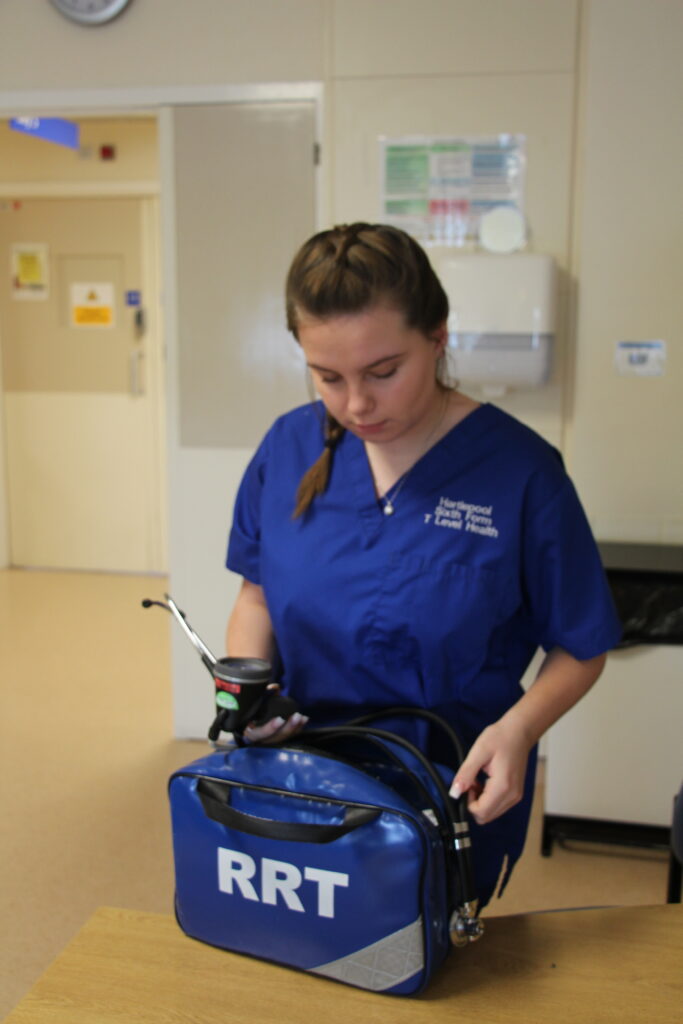
Has the placement met your expectations and how useful do you think it will be in your future career plans?
It has benefited me to get an insight of what it is like to be in this role, learning what it takes to take on the role and being able to show your knowledge and show skills that I have learnt at college. The healthcare professionals have been good at giving me opportunities to show this.
For example, when assisting a patient with washing and dressing, I am providing choices to the patient to ensure it is person centred care being provided and we are acting to the patient’s wishes.
What are your plans once your have completed your T Level qualification?
After receiving my level 3 qualification, I hope to attend Teesside University to become a qualified nurse within the community.
I have chosen this route as I want to receive a full education and have placements that will help me fully prepare for a role within healthcare.
Is there anything you do in your placement that people might not expect to be part of a healthcare role?
Observing patients getting bloods taken and seeing what the condition is and why tasks like carrying blood need to be completed.
Seeing the little tasks like making a patient’s bed, or assisting them to brush their hair or making a cup of tea and how grateful patients are of your help. This benefits the healthcare worker because they will feel honoured that patients are grateful for their help.
Different roles mean different responsibilities, so seeing how mentally prepared you have to be in situations; to ensure you maintain professionalism through any situation.
Would you recommend the T Level Health programme to others who want to get into healthcare?
Definitely – especially for individuals who want to work within a hospital trust, but don’t know what specific area as you get the chance to observe and take on responsibilities within different roles. It allows students to express interest in different roles and also to build and improve on their skills.
For example, I believe I wasn’t a confident individual, but placement has helped me improve on this skill by practicing using different types of communication to help me feel more confident when communicating with the patient.
Trust: Gateshead Health NHS Foundation Trust
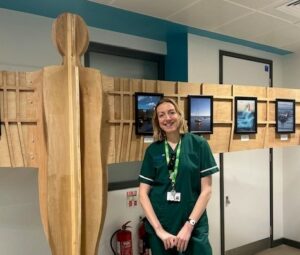 Sarah Browbank, a Women’s Health and Paediatric Pharmacist has worked at Gateshead Health NHS Foundation Trust since October 2018 across the emergency department and acute medicine. Sarah has been in her new role as Women’s Health and Paediatrics Pharmacist for a few months and describes how her role fits into the Trust, “My new role will be working across services for women and paediatrics, to support medicines management, medicines safety, medicines optimisation, and clinical support.”
Sarah Browbank, a Women’s Health and Paediatric Pharmacist has worked at Gateshead Health NHS Foundation Trust since October 2018 across the emergency department and acute medicine. Sarah has been in her new role as Women’s Health and Paediatrics Pharmacist for a few months and describes how her role fits into the Trust, “My new role will be working across services for women and paediatrics, to support medicines management, medicines safety, medicines optimisation, and clinical support.”
Currently, a typical day in the role is getting to know the areas across the hospital, learning how things work on each ward, getting to know the staff, and aiming to be able to work clinically to support the areas with medication advice.
Sarah comments on her new role in pharmacy, “The best part about my job is being able to work in a team to help ensure and improve patient care, and help those to get the best out of their treatment.” Sarah works across various teams and her role looks at how pharmacy can help with that particular service.
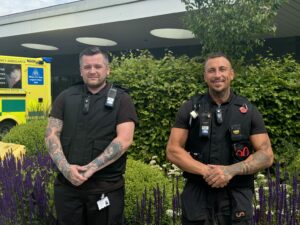 Lee Taylor Head of Security and Portering comments on the patient-centred approach of the security team.
Lee Taylor Head of Security and Portering comments on the patient-centred approach of the security team.
“Physical fitness is just one aspect of the job, learning verbal de-escalation, active listening, understanding spatial awareness and open body language is so important to stop aggressions before they become violent. A large number of incidents can be resolved with an open and compassionate conversation. Understanding the source of frustration for the individual and how you can help ultimately leads you closer to a solution than physical intervention ever could.”
Trust: Gateshead Health NHS Foundation Trust
Anisa Ali, Senior Specialist Biomedical Scientist tells us more about her role and the service.
The pathology department at the Queen Elizabeth Hospital provides services across Gateshead, Sunderland, and South Tyneside. Since the formation of South of Tyne Pathology services in 2014, the department has further developed its bowel cancer screening programme as well as taking on the cervical screening programme in 2019. It provides cervical screening and bowel screening across the whole of the North East and Yorkshire.
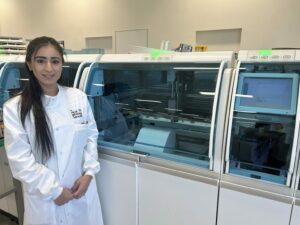 Anisa said:
Anisa said:
“I have worked at Gateshead Health since 2016 originally on placement as part of my degree. Once I completed my degree, I returned to the Queen Elizabeth Hospital as a full-time biomedical scientist. The Trust has been supportive of my career progression by helping me complete my specialist portfolio and later funding my masters, which has led to becoming a senior specialist.
Day to day we are analysing samples coming to the lab from across Tyne and Wear, other than this, we also release patient samples and help colleagues with diagnosis and prognosis. A typical day is 9am-5pm for most but the department works on a shift rota as it is such an essential service that is required 24 hours a day, 7 days a week 365 days a year. Other activities involve, setting up analysers, quality control checks, research, and development, which we fit into our day.
My role also involves the departmental management of Gateshead as well as, Sunderland and South Tyneside laboratories. This is because we work across all three labs to process patient samples. I enjoy everything about my job, despite its challenges, the Queen Elizabeth Hospital is a great place to challenge yourself and learn something new every day.”
Trust: Humber Teaching NHS Foundation Trust
Tell us about you and why you decided to pursue this career?
‘’I have been working in health care since I was 17. Nursing for me is a science and a work of the heart; a career that fulfils you in so many ways through helping others. It is a career that challenges you and brings joy and sadness in equal measure. I started as a HCA which sparked my love for nursing and desire to pursue nursing as a career. But my life took a different direction and I put my career on hold to bring up my 4 children. I continued to work whilst being a mum and progressed as a HCA and gained experience and skills in many different areas. In hindsight; those years of experience were invaluable to preparing me for undertaking my nursing degree. I started working for Humber NHS trust in 2020 as a band 4 assistant practitioner on an inpatient ward. Humber were happy to support me to complete my studies and the process was seamless as they worked closely with the Open University. Humber got the ball rolling very quickly and before I knew it, I was applying for the RNDA (Registered Nurse degree apprenticeship). I was successful in my application and was on the programme to start in February 2021.
Would you recommend this Apprenticeship to others withing to have a career in Nursing?
Definitely! The apprenticeship route serves so many benefits both to the student and the trust. It shows the trust invests in their staff and sets you off in your new career equipped with the support that you need. Although the course takes a little longer than normal due to it being part time it is worth it when you see your PIN on the NMC register for the first time. I would say to anyone to go for it and embrace every minute!! I am extremely proud of myself for completing the course and still pinch myself when I say out loud, I am a staff nurse!
What has the course given you?
The course has simply made my dream into a reality, the apprenticeship route is a great way to recruit, retain and develop staff who want to progress in their careers but have other commitments that make going to university full time challenging. The course challenged me personally and professionally, I have learned new skills particularly academically through essay writing and presenting work in groups, something which put me out of my comfort zone so was personally challenging for me. It has given me more confidence as a new registrant because I do not feel I have had a gap in work as the course has run alongside my job.
Trust: Humber Teaching NHS Foundation Trust
Tell us about you and why you decided to pursue this career?
‘’I began my career with Humber as a Healthcare Support Worker. Since then, I have successfully completed several apprenticeship programmes, including Senior Healthcare Support Worker Level 3, Nursing Associate Level 5, and Registered Nurse Degree Level 6. These accomplishments have not only enhanced my skills and knowledge but also allowed me to grow professionally within the organisation. I am soon to be a Registered Nurse, providing high-quality care to our patients and contributing to the overall success of our healthcare team.’’
What have the Apprenticeships done for you?
‘’The courses have significantly transformed my career. They equipped me with advanced clinical skills, critical thinking abilities, and a deeper understanding of patient care. These programs have also boosted my confidence and competence as a healthcare professional. I am now better prepared to handle complex medical situations and provide exceptional care to patients. Furthermore, the qualifications I have earned have opened new career opportunities and pathways for further specialisation within the nursing field.’’
Would you recommend this apprenticeship to others wishing to have a career in Nursing?
‘’Absolutely. I highly recommend these apprenticeship programmes to anyone aspiring to build a career in nursing. Overall, my experience has been extremely positive. The courses were well-structured, and the support from both the university and my colleagues was exceptional. These apprenticeships are an excellent investment in your future, providing a solid foundation for a fulfilling and rewarding career in healthcare.’’
“I joined the NHS after doing my nurse degree at 39 years old, I had worked previously in the Probation service and wanted to become a Nurse to try and make a difference in people’s lives. I went straight into a Practice Nurse role as this was what I really wanted to do after having a day with a Practice Nurse when I was a Student Nurse. 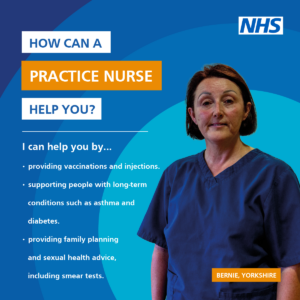
Practice Nursing is a complex role where you the opportunity to make a real difference to people.
I truly love my Job as I enjoy the fact that every day is different and I love being in an autonomous role which involves making lots of clinical decisions and I have a true passion for patient centred care.”

